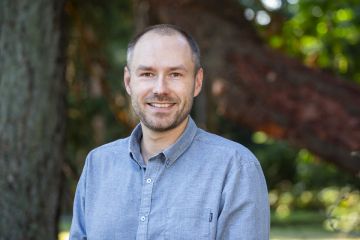New research indicates dementia symptoms can be reversed
When aging deteriorates a once-active and agile mind, it seems inevitable that the condition will only worsen. But new research by psychologist Dr. Holly Tuokko of UVic's centre on aging indicates this isn't always the case. After comparing data taken from over 10,000 Canadian seniors in 1990-91 and then again in 1996-97, she found that of those who survived, only 50 per cent who were first identified as having possible dementia symptoms advanced to Alzheimer's disease or another form of dementia. Another 20 to 25 per cent actually showed improvement or achieved a full recovery.
"Now we have to find out who these people are. Perhaps we'll be able to predict who is going to get better, or who will stay the same, or discover some preventative measures we can take to offset progression of dementia," says Tuokko, who will spend the summer analyzing data from the massive Canadian Study of Health and Aging, a part of Health Canada's National Health Research Development Program.
Unlike most psychological studies on dementia which focus on research subjects who have already sought help for symptoms of mental deterioration, Tuokko's data came from the same random sample of 10,263 Canadians being mined by other researchers. Her research also differs from work done by other psychologists in that she will go beyond simply tabulating how many of the subjects surveyed two years ago had died since they were first surveyed in 1990-91. Tuokko wants to analyze how they died, and determine if dementia influenced their death in any way.
The news that decline is not inevitable in persons with symptoms suggestive of dementia and that the condition could be stalled or reversed has created a stir among Tuokko's peers.
"It's information we didn't have before. Even though doctors and psychologists know that reversible conditions exist, they sometimes jump to conclusions and don't always investigate what could be causing the symptoms," says Tuokko, who hopes that her findings provide encouragement to caregivers and professionals who diagnose dementia patients.
-- 30 --
Media contacts
Dr. Holly Tuokko (centre on aging) at (250)
In this story
Keywords: new, research, indicates, dementia, symptoms, reversed




